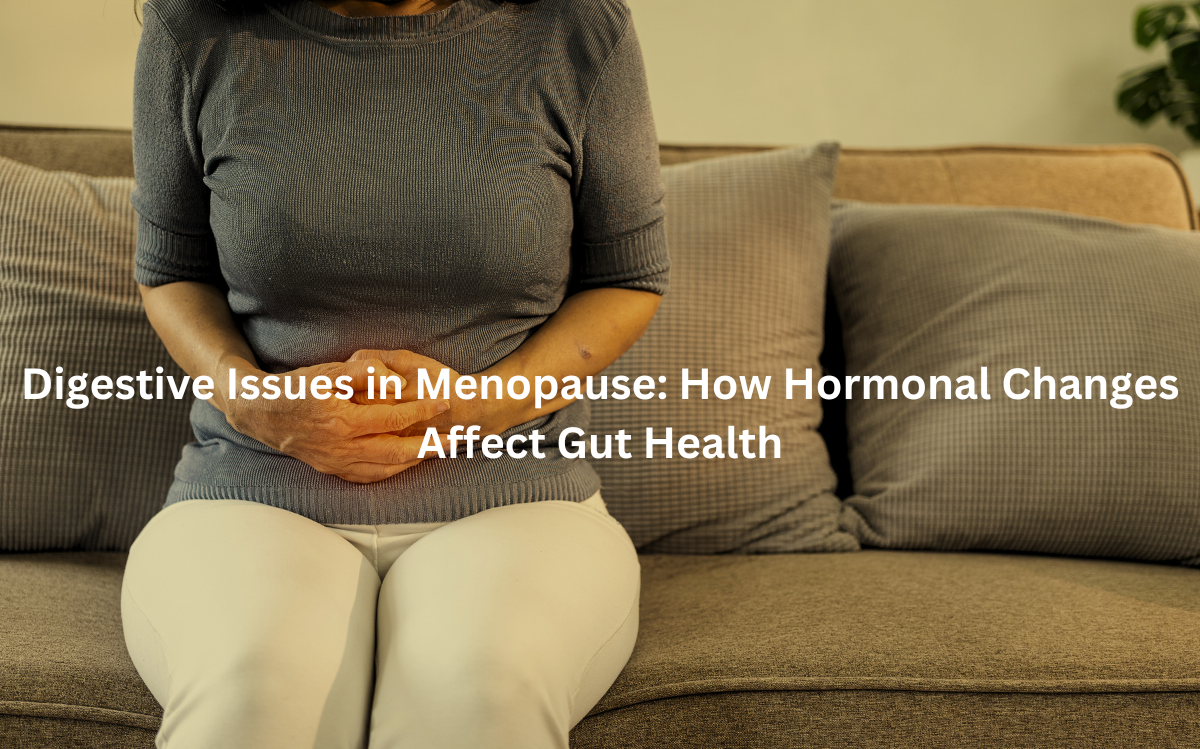Learn how menopause affects digestion and simple strategies to manage gut health and ease discomfort.
Menopause brings a host of changes to a woman’s body, and for many, digestive issues become a major concern. From bloating and acid reflux to IBS symptoms, hormonal fluctuations—especially drops in estrogen—can significantly impact gut health. (1)
Understanding these changes and knowing how to manage them is key to maintaining comfort and well-being during this transition.
Key Takeaways
- Hormonal shifts, particularly estrogen decline, contribute to common digestive issues like acid reflux and IBS.
- Managing stress and mental health can help alleviate digestive discomfort during menopause.
- Diet adjustments, including probiotics and avoiding trigger foods, are crucial for supporting gut health.
Understanding Digestive Issues During Menopause
For many women, menopause brings about more than just hot flashes and mood swings. One often overlooked symptom is digestive discomfort.
Whether it’s acid reflux, bloating, constipation, or abdominal pain, these issues can become more pronounced during menopause. The hormonal fluctuations, particularly the changes in estrogen and progesterone, have a significant impact on the digestive system.
The decline in estrogen levels during menopause plays a crucial role in digestive discomfort. Estrogen helps maintain the elasticity and function of the gastrointestinal (GI) system. As estrogen levels drop, the muscles in the digestive tract can become less efficient, which can slow down digestion and cause symptoms like:
- Bloating
- Constipation
Progesterone also contributes to digestive issues. This hormone relaxes the smooth muscles in the digestive tract, which can lead to problems like:
- Acid reflux
- Indigestion
Stress, diet, and lifestyle are additional factors that contribute to digestive discomfort during menopause, making this a challenging time for many women.
Link Between Hormonal Changes and GI Tract Health
Estrogen’s influence on the digestive system is well-documented. It helps regulate gut motility and promotes healthy bile flow, both of which are essential for digestion. As estrogen levels drop, the GI tract becomes less efficient, leading to issues like constipation, bloating, and gas. (2)
The gut microbiome, the collection of bacteria in the digestive system, also takes a hit when estrogen decreases. A disrupted microbiome can exacerbate gastrointestinal symptoms, contributing to the discomfort women feel during menopause.
Fluctuations in hormones can also trigger conditions like irritable bowel syndrome (IBS). Some women might find their bowel habits become unpredictable, alternating between bouts of constipation and diarrhea. These symptoms are often worsened by stress, which leads us to the next factor.
The Influence of Stress and Mental Health on Digestion
Stress is a major player when it comes to digestive issues during menopause. The stress hormone cortisol can exacerbate digestive discomfort. High cortisol levels can lead to increased stomach acid production, causing acid reflux, heartburn, or even gastritis. Chronic stress can also slow down digestion, leading to constipation and bloating.
But it’s not just cortisol that affects the gut. Mental health plays a crucial role in digestion, too. Mood swings, anxiety, and depression are common during menopause, and these conditions can disrupt the delicate balance of the digestive system.
Anxiety, for instance, can trigger symptoms like nausea, bloating, or diarrhea. Managing mental health becomes essential for women experiencing digestive issues during this time.
Simple lifestyle changes—like practising mindfulness, regular exercise, or even seeking therapy—can do wonders for both mental health and digestion. Addressing the root causes of stress can significantly reduce the strain on the digestive system.
Managing Acid Reflux and Heartburn

Acid reflux, or heartburn, is a common complaint for many women during menopause. The hormonal changes, particularly the decrease in estrogen, can weaken the lower esophageal sphincter (LES), the muscle that prevents stomach acid from moving up into the esophagus.
When the LES doesn’t function properly, acid reflux becomes more frequent, leading to that uncomfortable burning sensation in the chest.
Several lifestyle changes can help manage acid reflux during menopause. Eating smaller, more frequent meals, avoiding late-night snacks, and steering clear of trigger foods like chocolate, caffeine, and spicy dishes can all reduce symptoms.
In addition, maintaining a healthy weight and avoiding tight clothing can help ease the pressure on the stomach and prevent acid from backing up.
For women with severe GERD (gastroesophageal reflux disease), medications like proton pump inhibitors (PPIs) or antacids might be necessary. However, it’s always wise to consult a healthcare professional before starting any treatment.
Bowel Habit Changes and Irritable Bowel Syndrome (IBS) Symptoms
It’s common for women going through menopause to notice changes in bowel habits. Some may experience constipation, while others deal with diarrhea, especially if they have a history of IBS. Hormonal fluctuations, particularly in estrogen and progesterone, can trigger IBS symptoms, making bowel movements unpredictable.
Managing IBS during menopause can involve several approaches:
- Increasing fiber intake
- Adding fermented foods like yogurt and kefir
- Staying physically active
These strategies can help maintain smooth digestion. Probiotics may also be helpful, as they restore balance to the gut microbiome and reduce bloating and discomfort. However, not all probiotics are the same, so finding the right one is crucial for effective relief.
Dietary Recommendations for Digestive Health During Menopause
A healthy diet is essential for maintaining digestive health, especially during menopause. A well-balanced diet that includes plenty of fibre, healthy fats, and lean proteins can help manage menopause-related digestive issues. Foods rich in antioxidants, such as berries, leafy greens, and cruciferous vegetables, can help reduce inflammation and support gut health.
Fermented foods, such as yogurt, kefir, and kimchi, are particularly beneficial during menopause. These foods are packed with probiotics, which can help restore balance to the gut microbiome. In addition, foods high in fibre, like whole grains, beans, and vegetables, can aid in digestion and reduce constipation.
On the flip side, certain foods should be avoided. Caffeine, alcohol, and spicy foods can irritate the digestive system and worsen symptoms like acid reflux and bloating. It’s best to limit or eliminate these trigger foods during menopause to ease digestive discomfort.
The Role of Probiotics and Fermented Foods in Gut Health
Probiotics and fermented foods can significantly support gut health during menopause. During this time, hormonal fluctuations often lead to an imbalance in the gut microbiome, which can cause digestive issues like bloating, constipation, and even IBS.
Why Probiotics Matter
Probiotics are live bacteria that help restore balance to the gut. They can be found in:
- Supplements
- Fermented foods like sauerkraut, kimchi, and kombucha
These foods contain beneficial bacteria that can improve digestion and promote overall gut health.
Best Sources of Probiotics
For those looking to add probiotics to their diet, yogurt and kefir are excellent choices. Not only do they provide a boost to gut health, but they also offer additional nutrients that support:
- Bone health
- Heart health
Probiotic Supplements
If food sources aren’t enough, probiotic supplements are another option. However, it’s a good idea to consult with a healthcare provider to determine which option is best for individual needs.
Hormonal Therapy and Digestive System Support
Hormone replacement therapy (HRT) is a common treatment for managing the symptoms of menopause, including digestive issues.
HRT helps replenish estrogen levels, which can improve the function of the digestive system. For some women, this can mean less bloating, reduced acid reflux, and a more regular bowel pattern.
However, HRT isn’t without its risks. Women considering HRT should be aware of potential side effects, such as an increased risk of blood clots, stroke, or breast cancer.
It’s important to have a detailed discussion with a healthcare provider to weigh the benefits and risks of HRT based on personal health history and preferences.
For women who can’t or prefer not to use HRT, there are alternative options. Lifestyle changes, such as diet modifications and increased physical activity, can help manage menopause-related digestive issues.
In some cases, non-hormonal medications, such as antidepressants or antispasmodics, can help alleviate IBS symptoms and reduce digestive discomfort.
Conclusion
Menopause isn’t just about hot flashes and mood swings. It’s also a time when digestive health can be impacted by hormonal changes, stress, and other lifestyle factors.
Women experiencing digestive discomfort during menopause can find relief through a combination of dietary adjustments, probiotics, stress management, and in some cases, hormone replacement therapy.
Understanding the connection between hormones and digestion is key to managing symptoms. By making thoughtful lifestyle changes, seeking support from healthcare providers, and exploring all available treatment options, women can navigate this challenging time with greater ease.
Each woman’s experience is unique, so finding what works best for her is the most important step in reclaiming digestive health during menopause.
FAQ
How do hormonal shifts affect digestive function during menopause?
Hormonal shifts during menopause, especially in estrogen and progesterone levels, can significantly affect digestive function. Estrogen helps maintain the gut lining and digestive system health, while progesterone can slow down digestion, causing issues like bloating, constipation, and trapped wind.
These hormonal changes can also increase stress levels, which in turn may worsen GI issues such as diarrhea and constipation. Menopausal women may notice more pronounced digestive problems during this transition due to fluctuating hormones and other menopause symptoms.
How can I manage my digestive problems during menopause?
Managing digestive problems during menopause involves a mix of dietary and lifestyle changes. Start by keeping a food diary to track what you eat and how it affects your digestive system. Eating smaller, more frequent meals can help aid digestion and prevent bloating or stomach cramps.
Reducing processed foods and staying hydrated are also crucial for maintaining healthy digestion. Adding more good bacteria to your diet, such as in fermented foods, can support a healthy gut lining. Stress management and support groups can also help manage GI symptoms.
Can menopause symptoms lead to weight gain and other digestive issues?
Yes, weight gain is a common issue for menopausal women due to hormonal changes, particularly the decline in ovarian hormones and estrogen. This can affect your metabolism and cause changes in appetite. Along with weight gain, digestive problems like constipation, diarrhea, and gastrointestinal disorders can arise.
These GI symptoms may be worsened by emotional and mental stress or a lack of physical activity. It’s important to stay active, keep a food diary, and eat smaller meals to help manage both weight and digestive problems during this time.
How do night sweats and other menopause symptoms affect digestion?
Night sweats, hot flashes, and other menopause symptoms can have a significant impact on digestive health. Hormones estrogen and progesterone affect the GI system, which may lead to symptoms like bloating, acid reflux, and stomach cramps. Changes in bowel habits, such as diarrhea and constipation, can also occur during the menopause transition.
Emotional stress and sleep disturbances caused by night sweats can worsen GI issues. It’s essential to stay hydrated, manage stress levels, and consider menopause care to address both hormonal shifts and digestive problems.
Are there any dietary changes that can aid digestion during menopause?
Yes, dietary changes can play a major role in improving digestion during menopause. Eating smaller, balanced meals throughout the day can help reduce bloating, constipation, and stomach cramps. Avoiding processed foods and increasing fiber intake can promote healthy bowel function and reduce GI symptoms.
Keeping a food diary can help identify any specific foods that may irritate your digestive system. Including fermented foods with good bacteria, such as yogurt, can support gut health and aid digestion. Staying hydrated and managing stress levels also contribute to better digestive function.
How can I support my digestive system during menopause?
Supporting your digestive system during menopause involves several key steps. Start by eating smaller, more frequent meals to aid digestion and avoid stomach cramps or bloating. Keep a food diary to track what triggers GI symptoms, such as diarrhea or constipation.
Avoid processed foods and focus on a diet rich in fiber, fruits, and vegetables. Staying hydrated helps prevent constipation, and incorporating probiotics from fermented foods or supplements can support the gut lining. Managing stress levels and getting regular physical activity also improve digestive function during menopause.
References
- https://www.menopausecare.co.uk/blog/stomach-issues-menopause
- https://pmc.ncbi.nlm.nih.gov/articles/PMC8166071/

Leave a Reply